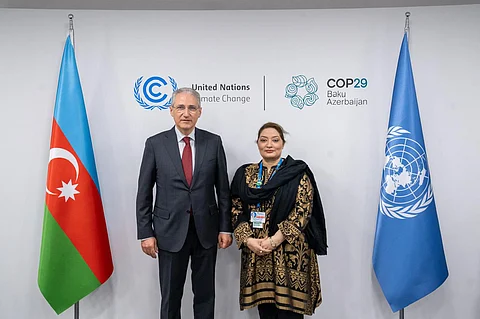

At the recently concluded global climate summit in Baku, Pakistan’s top environmental official urged India to initiate bilateral talks on climate change and air pollution, citing the shared environmental challenges faced by both countries. Despite the appeal, sources within the Indian government indicated that there are no immediate plans for such discussions.
Climate experts from both countries have supported the start of such a dialogue between the two neighbouring countries, which may be geopolitically distant but share a common concern about high climatic impacts and critical air pollution.
Romina Khurshid Alam, coordinator to Pakistan’s prime minister on climate change, spoke exclusively to this correspondent at the 29th Conference of Parties (COP29) to the United Nations Framework Convention on Climate Change held in Azerbaijan in November 2024.
Alam emphasised the urgency of collaboration. “Pakistan has always been ready to talk with India on climate change issues. Our chief minister of Punjab has very clearly said that recently, and I reiterate that, let’s sit together and discuss. Whatever the differences, this is a matter of our children,” she said.
She pointed out that both countries face severe impacts of climate change and air pollution, leading to respiratory illnesses and other public health crises. India, along with Pakistan and Bangladesh, forms the triad of the most air-polluted countries in the world.
“This is beyond us; the Union Ministry of External Affairs (MEA) has to make the decision regarding the proposed climate and pollution-related consultations between the two countries,” said a spokesperson for India’s Union Ministry of Environment, Forest and Climate Change to this correspondent recently, in response to the Pakistani official’s remarks.
The Climate Risk Index 2021, published by non-profit Germanwatch, highlighted the vulnerability of both nations to climate impacts. Between 2000 and 2019, India ranked third globally in average climate-related mortalities and second in financial losses. Pakistan ranked 11th and 7th, respectively, during the same period.
Air pollution further compounds the crisis. India was the third most polluted country in the world in 2023, with an average PM2.5 concentration of 54.5 micrograms per cubic metre (µg/m³), nearly 11 times above the World Health Organization’s (WHO) air quality guideline. Pakistan fared worse, ranking second with an average of 73.7 µg/m³ — 15 times the WHO limit.
Environmental experts from both nations support the idea of cross-border dialogue. Indian climate scientist Anjal Prakash emphasised the importance of a regional strategy, stating, “The environment knows no borders. Vulnerable populations, especially children, bear the brunt of climate change. Collaboration could foster resilience and lead to innovative solutions.” Prakash is a public policy expert, professor at the Indian School of Business, Hyderabad and former Intergovernmental Panel on Climate Change author.
Sanjay Vashist, director of the Climate Action Network South Asia (CANSA), echoed these sentiments. “Environmental and climate challenges on a larger scale cannot often be addressed within a single country’s borders. We need an ecosystem approach, which requires all South Asian countries to come together and find effective solutions,” he said. “Fighting alone, a country may bear heavy costs from climate-induced disasters.”
Abid Suleri, a climate expert from Pakistan and an advisor to the presidency of the recently concluded COP29, highlighted that unless countries collectively raise their climate demands, support will continue to fall woefully short of requirements.
“Take Pakistan’s 2022 floods, for example. Pledges of $10 billion were made, but more than two years later, we have received only 20 per cent of what was initially promised,” he noted.
Ali Jabir Malik, a senior Pakistani climate communication professional, called for a bilateral coalition to address pollution and climate change. “Smog does not recognise borders or religions. Our children are dying. India and Pakistan must establish a forum where scientists and political leaders collaborate,” he urged.
Malik suggested that Pakistan should take the lead in proposing a coalition, even if India remains noncommittal for now.
Experts stress that a lack of cooperation will only exacerbate the crisis for both nations. As Alam pointed out, the issue is no longer just political, its about survival for millions, specially children. “This is a human rights issue now,” she stated.